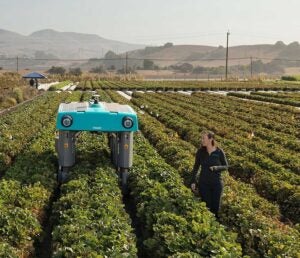As farms today adapt to rising challenges such as climate change, costs of production, and an aging labor force, many are turning to agtech as a solution. The technological innovations being employed involved the use of sensors, robotics, machines, and/or other information technology to help farmers with their practice.
Whether that’s through drones flying over fields to detect pest outbreaks, data collection using precision agriculture, or using machine learning to breed better crops, the possibilities of agricultural technology to leverage farmers to address problems has never been more promising.
Mineral, a Mountain View, California-based Alphabet company leveraging breakthroughs in AI, computer vision, and robotics, is hoping to use these tools to reimagine a more sustainable food system.
Established in 2017 by CEO Elliott Grant, the company became independent in early 2023 and aims to be, according to its website, a “resource for crop health, sustainability, and know-how for agriculture’s next leap forward” by focusing on “the increasing importance of agriculture’s role in the climate crisis, breakthroughs in machine learning, artificial intelligence, computer vision and robotics, and how agriculture’s rapid digitization is producing overwhelming amounts of data, but very few actionable insights.”
Speaking with Erica Bliss, Mineral’s Chief Commercial Officer, who has been with the company since 2019, brought into sharp focus exactly how Mineral is working to deliver on its mission and goals.

Bliss, who has a background in tech consulting, originally became interested in food systems when she volunteered with a nonprofit called TechnoServe to set up an IT system for a dairy co-op in Uganda. After several months, Bliss says she “fell in love” with learning about the complexities of agriculture and the food supply chain. Afterward, she continued to work with companies developing supply chain pipelines from smaller growers for several years to better understand the complicated ecosystem of agriculture and food systems.
From working with Walmart on their sustainability sourcing team to working at Syngenta as a Business Development Manager, Bliss brings a plethora of expertise and skills to lead Mineral’s mission in using tech — specifically AI — to drive agriculture forward.
One focus Bliss has is to scale up the partnership work that Mineral has with its collaborators. As Mineral is primarily a tech company, Bliss knows the value and importance of partnering with growers, breeders, and producers to fully understand the scope and depth of problems in agriculture.
One partner is CIAT, one of 15 research centers under CGIAR, a nonprofit research institution dedicated to transforming food, land, and water systems for a food-secure future. In their collaboration, Bliss hopes that Mineral can be connected with growers and provide equipment for high-throughput phenotyping, to enable more data collection at lower cost.
Collecting plant data on various traits can accelerate breeders’ efforts to develop more drought-tolerant varieties, or other critical traits necessary or adapting to the climate volatility in our future. Bliss hopes to generate these valuable datasets from production growers, who grow at a larger scale already, to maximize the breadth of data collection.
“I asked myself, how might I increase and improve a growers’ production?” said Bliss. Leveraging the power of technology to obtain useful data is important for breeders, along with Mineral’s collaboration with CIAT, means that it can focus on crops — such as sorghum, cowpeas, and beans — not typically supported by larger seed companies.
Partnering with industry companies allows Mineral to keep its focus on data analytics and technology, while drawing on and allowing experts in the agricultural sector to guide and inform their work.
Acknowledging that growers can often be wary of “big tech,” Bliss emphasizes the importance of starting with something small to prove Mineral’s capabilities. For example, Bliss recalls a collaboration Mineral is conducting with berry brand Driscoll’s using AI in the quality inspection process.
“We wanted to know: Can we establish a standard? Can we better understand [and] predict defects?” asked Bliss. The cross functional team of data analysts, operations managers, and hardware engineers at Mineral fostered a synergistic relationship to help develop a better quality control system with Driscoll’s.
Examples like this are just the tip of the iceberg for what tech innovations such as AI can offer the agricultural industry, and Bliss knows that in the high-risk environment that many farmers engage in, having a tech partner that can quickly de-risk trials and experiments can enable producers to do more.
While reluctance of farmers to share their data with tech companies is nothing new, Mineral’s approach of de-risking and transparency helps to build the trust necessary to lay the foundation for synergistic partnerships that can truly make a difference in the agricultural food system.
Bliss also aims to make a difference in the system by diversifying the faces she sees in her work. As an Asian-American female, Bliss often finds that she is a minority in both the technology and agriculture sector. She strives to pull in more women and underrepresented groups whenever she has the opportunity to, as she knows that bringing a diverse group of people to the table will also bring diversity in thought and voices contributing to positive change for agricultural practices.
Three of the seven leads among Mineral’s highest level are female, supporting Bliss’ vision for the future of agriculture. Bliss hopes to see broader diversity in not just the workforce but also in the crops cultivated by farmers, bringing in a broader range of nutritional value and crop resilience. She hopes to see more investment and engagement to support adaptability for growers, and is keen to show Mineral’s support for farmers.
To tackle the overwhelming problems that so many farmers today face, new and innovative solutions are needed, and artificial intelligence is an emerging resource that can help address these issues.
Mineral hopes to provide farmers with this resource, while demystifying the value of AI, machine learning, and robotics to build a foundation of trust in supporting a more sustainable, food-secure future.
Liza Thuy Nguyen serves as the 2023 American Farmland Trust Agriculture Communications Intern at AGDAILY, with a focus on helping to amplify diversity and minority voices in agriculture. Liza is originally from Anaheim, California, and attended the University of California, Davis, as a first-generation college student. She received a bachelor’s degree in genetics and genomics and went on to earn a master’s in horticulture from Penn State.





